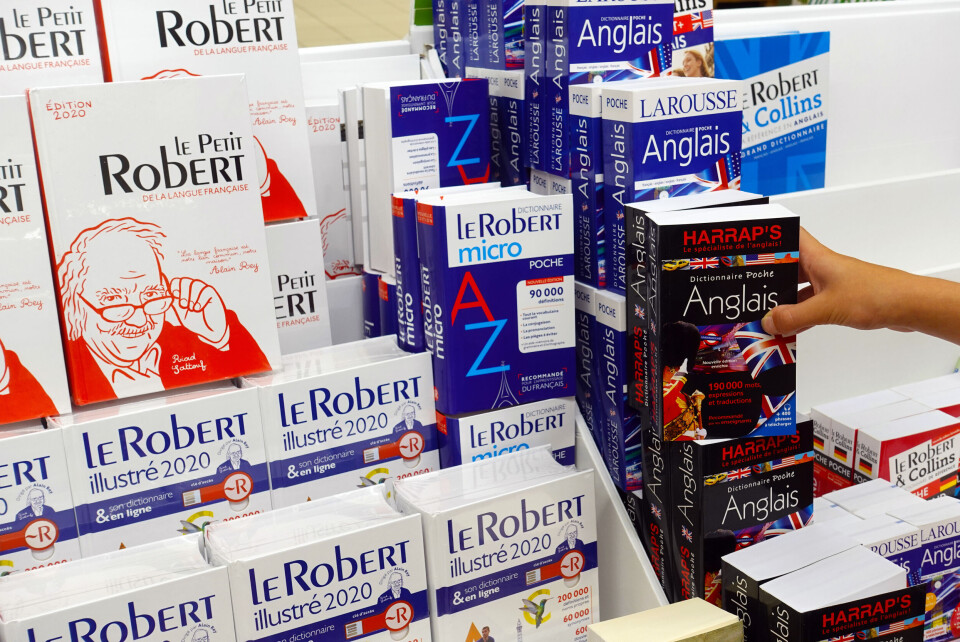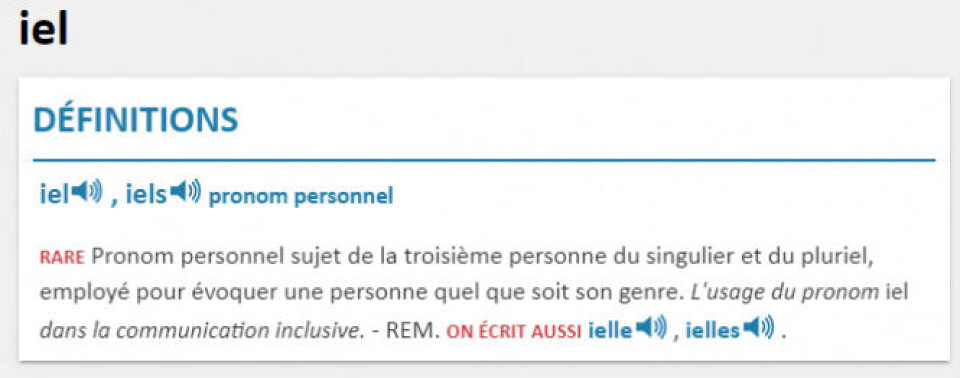-
Which French motorway toll subscription offers the best deal?
The ‘best’ packages vary depending on how often you use the road, the type of vehicle, and your destination
-
Alps avalanche risk remains high and 1,000 homes without power after heavy snow
Rail and road traffic disrupted but confinement order lifted for residents of Tignes in Savoie
-
Flights to and from France not expected to be affected by Gatwick Easter strike
Travellers are still advised to check their flight details this weekend
Le Petit Robert sparks debate by adding neutral pronoun to dictionary
The popular dictionary has added the word iel , which is a gender-neutral pronoun used by some French speakers

French dictionary Le Petit Robert has added the gender-neutral pronoun iel to its dictionary, provoking anger from the education minister, Jean-Michel Blanquer, and other politicians.
The word can be used to replace il or elle in French so as to refer to a person without assigning a masculine or feminine gender to them, similar to the use of 'singular they' in English.
A plural form, iels, also listed by the dictionary, can be used similarly to replace the plural pronouns ils or elles.
For example, if referring to a group of men in French, you would normally say ils sont contents to mean “they are happy”. Or, if referring to a group of women in the same way, you would say elles sont contentes.
This would effectively be iels sont content.e.s using the gender-free pronoun (and an agreement with 'inclusive language').
This can avoid the grammar rule in French, controversial to some feminists, which states that le masculin l'emporte sur le féminin ("the masculine takes precedence over the feminine"), meaning that when there are mixed groups, the masculine pronoun is always used.
If, for example, there was a group of seven women and one man, it would be grammatically correct in standard French to say ils sont contents.
The new pronoun is also used to refer to individuals who have a non-binary gender identity.
Le Petit Robert dictionary wrote of the word that it is:
“A personal subject pronoun in the third person singular and plural, used to refer to a person regardless of gender.”

Marie-Hélène Drivaud, editorial director of Le Petit Robert, told Le Figaro they chose to include the word because they noticed it was “growing in frequency of use”.
The word will have to go through a probationary period, but has already been added to the online dictionary with the intention of it being included in the 2022 paper edition.
It was added at the same time as words such as vaccinodrome, antivax and pass sanitaire, all Covid-related words that are now commonly used.
Controversy
The inclusion in the popular dictionary of the gender-neutral pronoun did not go down well with everyone in France.
François Jolivet, the MP for Indre, who is a member of Emmanuel Macron’s La République En Marche party, notably criticised the decision.
He called Le Petit Robert’s authors “militants of a cause that has nothing French about it: wokism.”
He wrote of his dissatisfaction to the Académie française, a leading authority for matters pertaining to the French language.
And Education Minister Jean-Michel Blanquer tweeted his support for Mr Jolivet’s criticism.
“Inclusive writing is not the future of the French language,” he tweeted.
“At a time when our pupils are consolidating their fundamental knowledge, they should not have this as a reference,” he added, referring to the word “iel”.
Le Petit Robert includes words based on usage and not necessarily words deemed “grammatically correct” according to the Académie française.
Je soutiens évidemment la protestation de @FJolivet36 vis-à-vis du #PetitRobert
— Jean-Michel Blanquer (@jmblanquer) November 16, 2021
L’écriture inclusive n’est pas l’avenir de la langue française.
Alors même que nos élèves sont justement en train de consolider leurs savoirs fondamentaux, ils ne sauraient avoir cela pour référence: https://t.co/09thJzQ7iN
Related articles
Franglais ou Frenglish? The history of French resistance to English
Should the French language be changed to be made less masculine?
French linguist Alain Rey dies aged 92
























